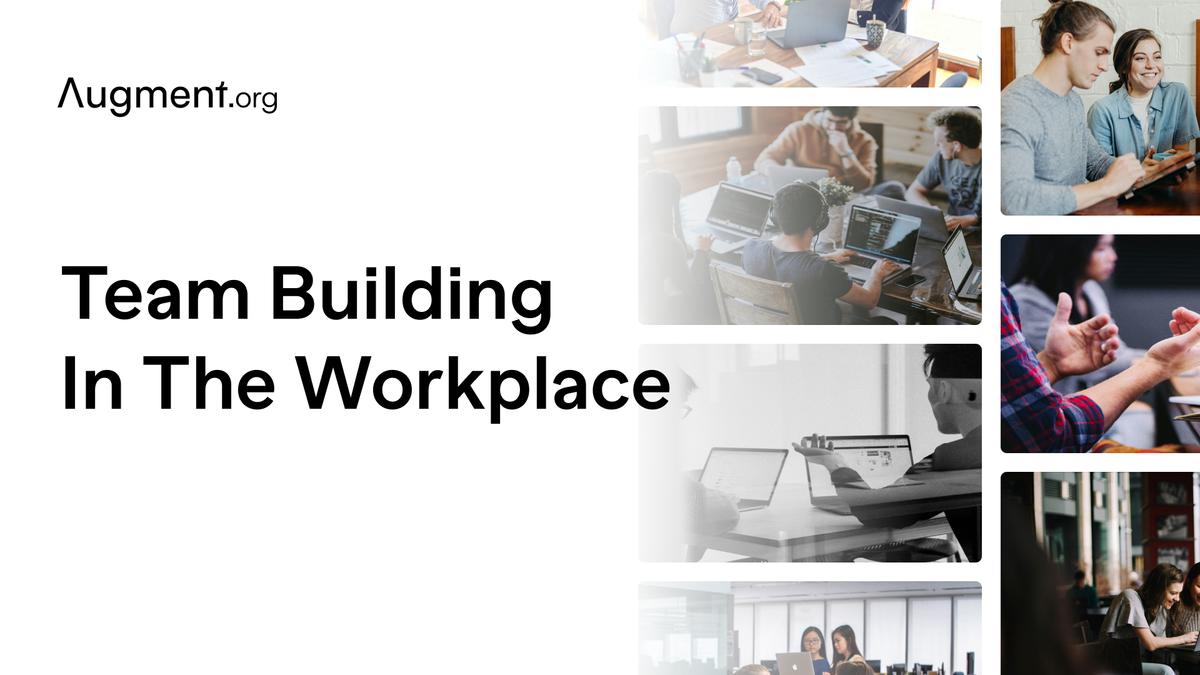Benefits of Team Building in the Workplace
Team building transforms a group of individuals into a cohesive unit ready to achieve goals with efficiency and creativity. From enhancing problem-solving skills to boosting employee morale, the benefits of team building permeate every facet of an organization.

What is Team Building?
Team building is an essential strategy that goes beyond mere group activities. It’s a deliberate process designed to improve team performance and foster a positive work environment. At its core, team building involves a range of activities and exercises aimed at strengthening the relationships and dynamics within a team. This process is not just about having fun; it’s about creating a foundation where team members can build trust, develop better communication skills, and collaborate more effectively while respecting diverse perspectives and backgrounds.
Effective team building helps break down barriers in communication, encourages employees to understand and respect each other’s perspectives, and creates a sense of belonging and team spirit. Whether it’s through team building events, exercises, or regular activities, the goal is to create a more cohesive and successful team. This is particularly important in today’s diverse workplaces, where team members often come from varied backgrounds and have different skill sets.
By focusing on team building, organizations can create an environment where every team member feels valued and is encouraged to contribute their best. This not only boosts employee morale but also contributes significantly to the organization's success. In essence, team building is not just an event or an activity; it's an ongoing process that plays a crucial role in developing a strong, effective team.
Why is Team Building Important?
Team building is a vital component in the modern workplace, serving as a bridge that connects individual talents and efforts to the collective success of an organization. Its importance cannot be overstated, as it directly impacts the overall productivity and morale of a team.
- Team building lays the foundation for effective communication. In an environment where communication barriers exist, team building events and activities serve as an icebreaker, encouraging open dialogue and understanding among team members. This improved communication is essential for fostering a positive work environment, where everyone feels heard and valued.
- Employee engagement is easily improved through team building. Engaged employees are more likely to be invested in their work and the success of the company. Through team building activities, employees can feel more connected to their colleagues and the organization, boosting their morale and motivation.
- Team building helps in developing and honing problem-solving skills. When team members are put together in various scenarios, they learn to tackle challenges collaboratively, finding innovative solutions that might not have been possible individually.
- For teams that include remote members, team building becomes even more essential. It helps bridge the physical gap, ensuring that remote teams feel as much a part of the company culture as their in-office counterparts. This is especially important in today's global work environment, where remote working is becoming increasingly common.
- Team building contributes to a more positive and cohesive company culture. A strong company culture is instrumental in attracting and retaining top talent, and team building activities play a significant role in shaping and reinforcing the values and ethos of a company.
In essence, the importance of team building lies in its ability to transform a group of individuals into a unified team with a common goal, ensuring that each team member is aligned with the organization's objectives and is working effectively towards achieving them.
11 Benefits of Team Building
Team building plays a pivotal role in shaping the dynamics of a workforce. From boosting innovation to improving communication, the benefits of team building touch every aspect of a team's functioning.
1. Fostering Innovation with Collaborative Efforts
Team building enhances innovation within teams. When diverse minds collaborate, they bring together a variety of perspectives and skills, sparking creativity. This environment encourages team members to brainstorm innovative solutions to challenges, leading to breakthroughs that individual efforts might not achieve. Team building activities specifically designed to encourage creative thinking can significantly contribute to this innovative spirit.
2. Cultivating a Culture of Fun and Engagement
Team building activities often incorporate fun and engaging elements, which are crucial in alleviating workplace stress and building positive relationships among co-workers. These activities create a more relaxed atmosphere where employees can interact freely, leading to a more positive work environment. Engaging in fun activities together also helps team members to bond, fostering a sense of team spirit and camaraderie, which can contribute to intrinsic motivation.
3. Strengthening Organizational Culture
Organizational culture is greatly influenced by how well team members work together. Team building helps inculcate values such as mutual respect, collaboration, and collective responsibility. Regular team building events reinforce the company’s values and ethos, contributing to a stronger, more cohesive company culture. This, in turn, boosts employee morale and retention.
4. Improving Communication
Effective communication is a cornerstone of successful teamwork. Team building exercises are instrumental in breaking down communication barriers and enhancing open and honest dialogue. Through team building, members learn to express their ideas and listen to others, leading to better understanding and cooperation within the team.
5. Elevating Brainstorming Sessions Through Team Dynamics
Team building activities that involve problem-solving and brainstorming encourage team members to pool their ideas and expertise. This collective effort often leads to more creative solutions than what an individual could come up with alone. These sessions also help in developing and honing critical thinking skills.
6. Uniting Towards Common Goals
Team building unifies team members around common objectives. Through various team building exercises, members understand the importance of working towards shared goals, which is essential for the success of the team and the organization. This unity helps in aligning individual efforts with the company's mission and objectives.
7. Problem-Solving
Team building activities often place team members in scenarios where they need to solve problems together. This not only enhances their problem-solving skills but also teaches them to approach challenges collaboratively, considering different viewpoints and solutions.
8. Building Trust
Trust is fundamental to any team's success. Team building activities help establish and deepen trust among team members. When employees participate in team challenges and rely on each other to succeed, it builds a foundation of trust that is vital for a healthy, functioning team.
9. Efficiency in Operations
Efficient teamwork is a direct outcome of effective team building. When team members understand each other’s strengths and weaknesses, they can work more cohesively, leading to increased efficiency and productivity in operations. This efficiency is especially important when teams face tight deadlines or challenging projects.
10. Individual Strength Development
Team building helps in identifying and nurturing individual strengths. Team members get opportunities to showcase their abilities and learn new skills from their peers. This not only helps in personal development but also contributes to the team’s overall skill set.
11. Enhancing Decision-Making Skills
Team building exercises often involve making decisions as a group, which can improve decision-making skills. Teams learn to weigh various options, consider the consequences of their decisions, and arrive at conclusions that are beneficial for the team and the organization. This collaborative decision-making process is crucial for the team's success.
10 Team Building Exercises
Team building exercises play a crucial role in enhancing teamwork and boosting employee morale. Here are some specific activities that can be employed to achieve various team building benefits:
- Problem-Solving Challenges: Escape Rooms
Teams are locked in a themed room and must solve puzzles and find clues to escape within a set time. This activity sharpens problem-solving skills and encourages creative solutions.
- Trust-Building Activities: Minefield
In a "minefield" of obstacles, one blindfolded team member must navigate through the course guided only by the verbal instructions of their teammates. This exercise builds trust and effective communication within the team.
- Communication Exercises: Back-to-Back Drawing
Two team members sit back-to-back, one with a picture and the other with a drawing pad. The one with the picture describes it without naming it, and the other attempts to draw it. This enhances listening and interpretation skills.
- Creative Workshops: Team Murals
Teams are given canvases, paints, and brushes to create a mural that represents the company's culture or values. This encourages creativity and team collaboration, and the murals can decorate the workplace.
- Outdoor Team Building Events: Adventure Sports
Activities like rafting, hiking, or obstacle courses are great for team building. They encourage a team spirit and can be especially effective for teams that usually work remotely.
- Role Reversal Exercises: Job Swap
Team members swap roles for a day or a few hours. This helps team members appreciate each other's responsibilities and fosters a more cohesive work environment.
- Feedback Sessions: Team Reflection Meetings
Regular meetings where team members provide constructive feedback to each other in a supportive environment. This helps hone conflict resolution skills and ensures all team members feel heard.
- Cultural Exchange Days: International Food Fair
Team members bring dishes from their cultural background to share with the team. This event celebrates diversity and helps team members learn about and appreciate different cultures.
- Mental Health Workshops: Mindfulness and Meditation Sessions
Guided sessions that focus on mental well-being, teaching relaxation and stress management techniques. This can help in relieving chronic workplace stress and improving mental health.
- Charity Work as a Team: Community Service Projects
Engaging in community service like volunteering at a local shelter or organizing a charity fundraiser. This not only serves the community but also helps build a positive team spirit and company image.
These team building activities can significantly boost morale, improve communication, and increase employee retention. They help teams work better together, making the workplace a more enjoyable and productive environment.



